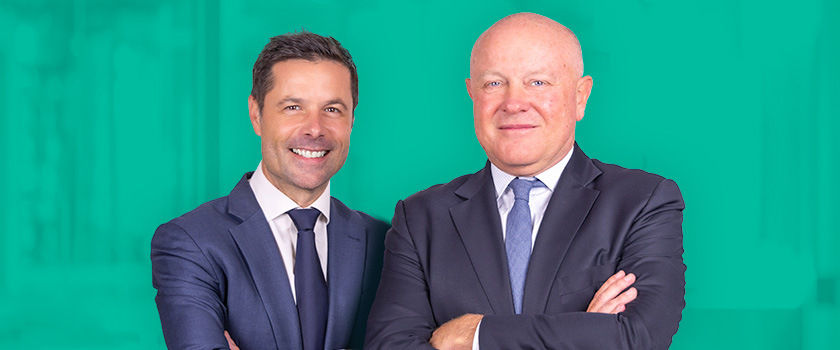Asian Private Banker (12.2022) - UBP Asia CEO looks back at 2022 and forward at 2023
The last 12 months have undeniably been volatile for private banks. How have you navigated these headwinds in order to protect AUM and revenue, attract net new assets and maintain the client base?
From a client perspective, investors were largely in risk-off mode throughout the year, showing limited appetite to rebalance portfolios, limited appetite to add risk and increased appetite to increase cash allocations. The business mix in 2022 reflected these trends, with reduced transactional activity offset by higher net interest income.
From a net new money perspective, NNM inflows continued from across our principal markets of Greater China and ASEAN, as well as strong inbound inflows from the Middle East and other international markets into Singapore, looking to access Asian-focused investment expertise.
From a strategic perspective, we focused on three priorities in 2022:
- Develop China: In June 2022, we established a new office in Hainan and secured a qualified domestic limited partnership (QDLP) licence allowing UBP to offer global investment strategies to qualified domestic investors. This made UBP the first Swiss wealth and asset manager to open an office in Hainan under the QDLP programme. We are now in the final due diligence stages for our first fund launch.
- Build Alternatives Capabilities: in 2022, we have seen client demand in two principal areas: pre-IPO opportunities at deep market discounts; and government real estate, a UBP strategy which offers exposure to properties on long-term lease to public bodies in the US and Europe. In addition, we are expanding our hedge fund coverage to family offices in Hong Kong and will appoint a hedge fund advisory head in Asia in 1Q23.
- Play up FX Capabilities: the market volatility made 2022 an exceptional year for FX, with volumes and revenues doubling year on year.
Global markets this year have been rocked by decades-high inflation, rising interest rates and a plethora of geopolitical challenges ranging from Russia’s invasion of Ukraine to fresh tensions between Washington and Beijing. What will be the key investment themes for the market in 2023? How are you advising clients to invest in the region of Asia-Pacific?
Perhaps the biggest consequence of the challenges encountered in 2022 is in the bond market which now, for the first time in more than a decade, offers investors reasonable risk-adjusted returns. High-quality bonds are yielding 6% for the first time since the 2008 Global Financial Crisis, offering investors a cushion from high coupons to weather the ongoing economic, geopolitical and policy uncertainty.
Looking to Asia, emerging markets generally, and China specifically, are at a different point in the economic cycle than the developed world, emerging from recession. As a result, investors can benefit from this cyclical recovery by investing alongside the policy stimulus that is being delivered to strengthen the recovery momentum in 2023. We expect investment in the energy transition to be at the forefront of this policy effort in Asia-Pacific, providing a tailwind for investors in 2023.
In 2022, China’s economy has been challenged by ongoing COVID-19 restrictions and a weaker real estate market. How are you helping your clients to mitigate the investment risks in the world’s second-largest economy?
China’s economic growth will likely recover to around 5% in 2023, after registering below-potential levels in 2022. The authorities have announced measures to support the housing sector and we expect monetary and fiscal policy stances to remain accommodative in 2023 – against a backdrop of policy tightening virtually everywhere else in the world.
Although headwinds surrounding COVID-19 and the housing sector still pose challenges, the cyclical recovery should provide support for Chinese equities in the quarters ahead. Equities look attractive on a relative basis, while we observe fewer downside risks on the earnings front. However, investors need to consider that the investment paradigm has changed in the new era of “Common Prosperity” and they should look to generate returns over a longer investment horizon.
Stabilising the housing sector will require time, so we are maintaining a more selective approach and gravitating towards higher-quality bonds and short duration on the fixed income front.
COVID-19 was an accelerant in terms of investments in digitalisation in the private banking industry. But with the pandemic finally receding in Asia-Pacific, how will private banks best combine technology with a high-touch, face-to-face service, both in terms of clients and RMs? What will be the focus for tech investments in 2023?
Five years ago, technology’s impact on wealth management was presented as a zero-sum game, as a binary choice between digital or human engagement. The debate has clearly matured and we see a hybrid future, where technology enables richer conversations with clients.
This may encompass digital communication channels, involve AI-assisted investment insights and asset allocation, or simply be about removing some of the pain factors in the way that clients interact with banks. More precisely targeted technology can have a transformative impact on client relationships by supporting, rather than removing, the role of the relationship manager.
For the mass affluent wealth business, there is a much stronger argument for a lighter-touch, higher-volume model which is largely digitally driven. However, for pure-play private banks, human interaction remains the core around which we build, so we see technology as an enabler, boosting our proposition, enhancing our investment capabilities, and improving delivery.
Hong Kong and Singapore, Asia’s two key offshore wealth hubs, have both reopened following COVID-19 this year, albeit on different timelines. What are the relative attractions of both cities in terms of the regional wealth industry and has Hong Kong significantly fallen behind Singapore?
Growth rates in both the Hong Kong and Singapore businesses remained robust in 2022 and we see continued demand from clients across both locations.
While it is natural to compare the two financial centres, we do not see this as a zero-sum game, where one centre loses if the other wins. Both have distinct advantages that position them well for future growth.
Singapore has been highly successfully in attracting new capital inflows, both from within the region and from other regions, in 2022. Clients appreciate the Lion City’s stability, its progressive approach to business, its status as a regional business hub and the many lifestyle and education attributes that befit a world-class international financial centre. An increasing number of global wealthy families and their family offices see it as a dependable booking centre and as a source of expertise for the allocation of assets in Asia.
Despite recent challenges, Hong Kong’s prospects remain bright for three reasons. First and foremost, geography matters and Hong Kong’s proximity to mainland China – with 1,000 billionaires, 6 million millionaires and a wealth pool of USD 85 trillion – makes it the first stop for many wealthy mainland Chinese. Second, mainland China will still need an international finance centre to facilitate international capital formation and deployment. For as long as the RMB is not convertible, Hong Kong will play this critical role for the mainland Chinese economy, to the direct benefit of its wealth and asset management businesses. Finally, and perhaps most importantly, innovation and agility are in Hong Kong’s DNA – the city has a track record of adapting to market opportunities. The major opportunity on Hong Kong’s doorstep is the Greater Bay Area – with an economy the size of Canada – and the next chapter in the growth of Hong Kong’s wealth management industry will depend, in part, on the extent of capital mobility within this economic zone.
ESG and sustainability are generally higher up the agenda than ever for private clients in the region. However, many ESG-focused funds and products have struggled this year amid market volatility and a surge in prices for traditional fossil fuels. How do private banks continue to generate interest in ESG-related investments against this backdrop?
We see increasing client interest in sustainability, particularly from quasi-institutional clients. Even with geopolitical risk, market volatility and a challenging backdrop of inflationary pressures, UBP’s impact strategies have experienced encouraging flows year-to-date, especially in our Positive Impact Emerging Equity solution.
In the short term, we see a depth of opportunities in the social themes that have experienced so much disruption during the COVID-19 crisis. Education and financial companies – particularly in microfinance – are still in the process of returning to their normal levels of profitability and, in some cases, can even benefit from higher interest rates. This creates an opportunity for investors.
In the longer term, the need for more sustainable business models is not about to abate. Emerging markets (EM) are home to many companies providing solutions in the fields of electric mobility, renewables and energy efficiency. Moreover, basic infrastructure, water and electricity, along with financial inclusion, can be more easily accessed in EM than in other markets, presenting a broad range of opportunities to investors in EM equities.
It is estimated that 80% of Asia’s household wealth is kept onshore outside of the key wealth hubs of Hong Kong and Singapore. How do private banks best tap the potential of onshore markets?
Our primary focus in Asia remains on providing global wealth management advice from the international financial centres of Hong Kong and Singapore. We see enduringly strong demand for international wealth advice – the majority of wealthy clients have multi-jurisdictional needs, many have a nexus in Hong Kong, Singapore, London or Switzerland and they appreciate the full range of services that can be offered from both hubs.
In addition to this, we established a new office in mainland China in 2022, underscoring the size and future potential of the mainland China wealth management market. Our focus here is on providing domestic investors with investment solutions for the global component of their overall asset allocation, utilising the QDLP scheme.
Where will your bank focus its hiring efforts in 2023, in terms of front, middle, and back office? What are the key attributes you are looking for and how do you plan to find them?
From a market perspective, we may expand coverage across our traditional markets of Greater China, Singapore Domestic, ASEAN and NRI Asia. We also see opportunities to add to our teams covering international clients and Greater China markets from and in Singapore.
From an RM perspective, our focus remains on working with like-minded professionals who share our commitment to investment excellence and are looking for a bank that combines the flexibility of a family office with an institutional-grade product platform and balance sheet.
Over the past five years, we have found particularly strong alignment with RMs who have between 10 and 20 years of experience, who want to work with a bank where they can manage clients and, if they wish, build a team. They are attracted by our balanced commercial approach, flat hierarchy and the freedom we give to build long-standing relations with clients.








